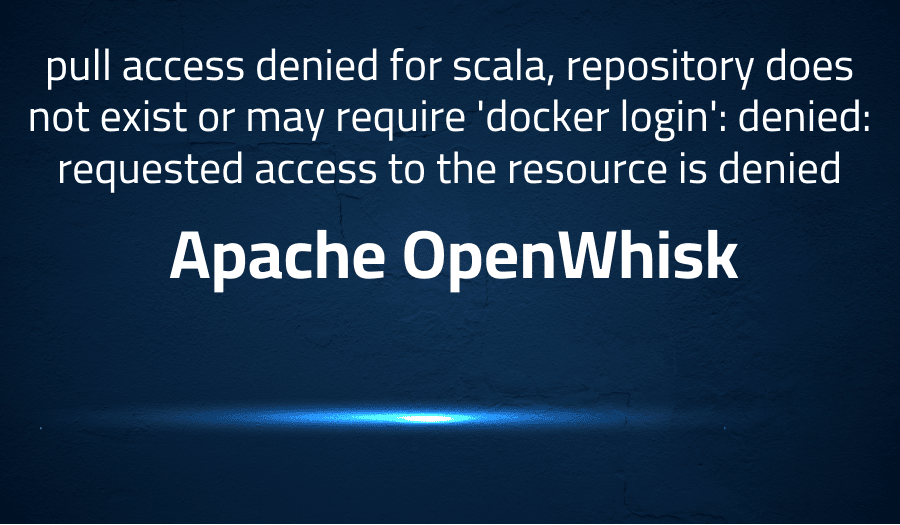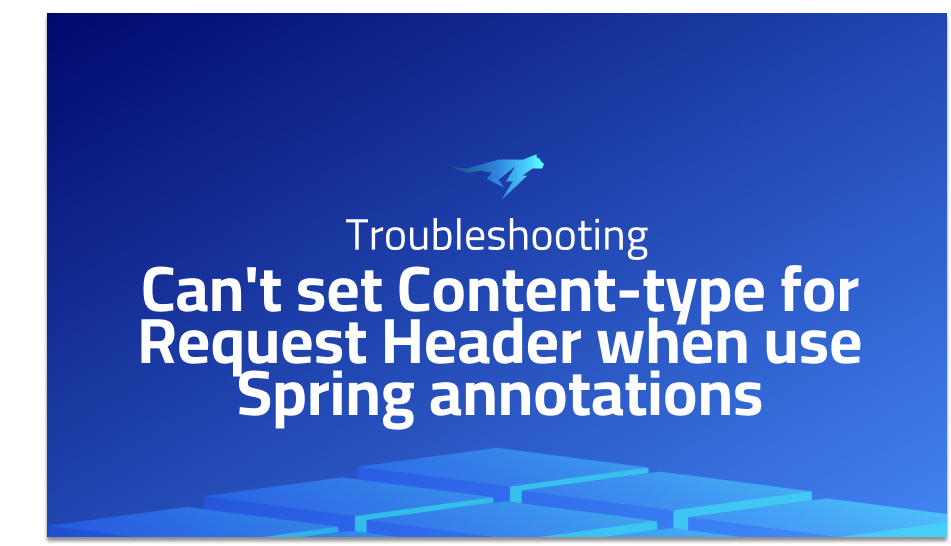

pull access denied for scala, repository does not exist or may require ‘docker login’: denied: requested access to the resource is denied in Apache OpenWhisk
Explanation of the problem
Upon execution of the command ./gradlew :core:standalone:distDocker, the following error occurred while building using Scala 2.12:
Configure project :core:scheduler
[task ':core:scheduler:assemble', task ':core:scheduler:assembleDist', task ':core:scheduler:build', task ':core:scheduler:buildDependents', task ':core:scheduler:buildEnvironment', task ':core:scheduler:buildNeeded', task ':core:scheduler:check', task ':core:scheduler:checkScalafmt', task ':core:scheduler:checkScalafmtAll', task ':core:scheduler:checkScoverage', task ':core:scheduler:checkScoverageScalafmt', task ':core:scheduler:checkTestScalafmt', task ':core:scheduler:classes', task ':core:scheduler:clean', task ':core:scheduler:cleanEclipse', task ':core:scheduler:cleanEclipseClasspath', task ':core:scheduler:cleanEclipseJdt', task ':core:scheduler:cleanEclipseProject', task ':core:scheduler:compileJava', task ':core:scheduler:compileScala', task ':core:scheduler:compileScoverageJava', task ':core:scheduler:compileScoverageScala', task ':core:scheduler:compileTestJava', task ':core:scheduler:compileTestScala', task ':core:scheduler:components', task ':core:scheduler:dependencies', task ':core:scheduler:dependencyInsight', task ':core:scheduler:dependentComponents', task ':core:scheduler:distTar', task ':core:scheduler:distZip', task ':core:scheduler:eclipse', task ':core:scheduler:eclipseClasspath', task ':core:scheduler:eclipseJdt', task ':core:scheduler:eclipseProject', task ':core:scheduler:help', task ':core:scheduler:install', task ':core:scheduler:installDist', task ':core:scheduler:jar', task ':core:scheduler:javadoc', task ':core:scheduler:model', task ':core:scheduler:prepareKotlinBuildScriptModel', task ':core:scheduler:processResources', task ':core:scheduler:processScoverageResources', task ':core:scheduler:processTestResources', task ':core:scheduler:projects', task ':core:scheduler:properties', task ':core:scheduler:reportScoverage', task ':core:scheduler:run', task ':core:scheduler:scaladoc', task ':core:scheduler:scalafmt', task ':core:scheduler:scalafmtAll', task ':core:scheduler:scoverageClasses', task ':core:scheduler:scoverageScalafmt', task ':core:scheduler
Troubleshooting with the Lightrun Developer Observability Platform
Getting a sense of what’s actually happening inside a live application is a frustrating experience, one that relies mostly on querying and observing whatever logs were written during development.
Lightrun is a Developer Observability Platform, allowing developers to add telemetry to live applications in real-time, on-demand, and right from the IDE.
- Instantly add logs to, set metrics in, and take snapshots of live applications
- Insights delivered straight to your IDE or CLI
- Works where you do: dev, QA, staging, CI/CD, and production
Start for free today
Problem solution for pull access denied for scala, repository does not exist or may require ‘docker login’: denied: requested access to the resource is denied in Apache OpenWhisk
This error message indicates that you are trying to access a Docker image from a repository and you do not have the necessary permissions. To resolve this issue, you can try the following steps:
- Log in to the Docker repository: Run the command
docker loginand enter your credentials to log in to the repository. - Check the repository name: Ensure that the repository name is correct and exists in the Docker registry.
- Check access permissions: If you still cannot access the repository, check if you have the necessary permissions to access it. Contact the repository owner or administrator to request access if needed.
- Try using a different repository: If the repository is not accessible, try using a different repository that contains the image you need.
If these steps do not resolve the issue, please provide more details, such as the specific repository name and the Docker image you are trying to pull.
Other popular problems with Apache OpenWhisk
Problem: Access Denied Error when Pulling Docker Images
When trying to deploy an action in Apache OpenWhisk, users may encounter an error message stating “pull access denied for [image name], repository does not exist or may require ‘docker login’: denied: requested access to the resource is denied.”
Solution:
This error occurs when the Docker image required to run the action is not present in the local Docker registry and OpenWhisk is unable to pull the image. To resolve this issue, the user must ensure that they have the necessary permissions to access the Docker image, either by logging into the Docker registry using the ‘docker login’ command or by using a public Docker image.
Problem: Action Timeout
Apache OpenWhisk actions have a default timeout of 60 seconds, after which the action is terminated if it has not completed. In some cases, actions may take longer to complete, resulting in a timeout error.
Solution:
To resolve this issue, the user can increase the timeout value for the action. This can be done by specifying the timeout value when creating the action, or by updating the timeout value for an existing action. It is also possible to increase the global timeout value for all actions in the OpenWhisk configuration.
Problem: Inconsistent State of Actions
Apache OpenWhisk uses an eventually consistent model, meaning that there may be a delay between an update to an action and when that update is reflected in the system. This can result in inconsistencies in the state of actions, leading to unexpected behavior or errors.
Solution:
To resolve this issue, it is recommended to use an explicit synchronization mechanism, such as a lock or semaphore, to ensure that actions are updated in a consistent manner. Additionally, it may be necessary to implement retries or backoff strategies to handle potential inconsistencies in the state of actions.
A brief introduction to Apache OpenWhisk
Apache OpenWhisk is an open-source serverless computing platform that provides a way to execute code in response to events or direct invocations. It allows developers to build and run microservices and event-driven applications on a scalable, multi-tenant cloud environment. OpenWhisk abstracts away infrastructure management and abstracts the underlying infrastructure into small, single-purpose functions known as actions.
OpenWhisk provides a comprehensive platform for developing, deploying, and managing serverless applications. It offers an API Gateway for invoking actions and a user-friendly web interface for managing actions and triggers. The platform also provides features such as automatic scaling, high availability, and monitoring, allowing developers to focus on writing code instead of managing infrastructure. OpenWhisk supports multiple programming languages, including JavaScript, Swift, Java, and Python, and can easily integrate with other cloud services and event sources such as databases, messaging systems, and web services.
Most popular use cases for Apache OpenWhisk
- Event-Driven Computing: Apache OpenWhisk can be used for event-driven computing by executing functions in response to specific events such as an HTTP request, a message being posted to a message queue, or a file being added to cloud storage. This allows developers to create applications that can automatically respond to changes in their environment in real-time.
- Serverless Computing: Apache OpenWhisk can be utilized as a platform for serverless computing. This means that developers can write and deploy code without having to manage the underlying infrastructure. This can greatly reduce the operational overhead of deploying and managing applications and allows developers to focus on writing code that provides value to their users.
- Code Execution: Apache OpenWhisk allows developers to execute arbitrary code snippets in response to specific events. For example, the following code block written in Node.js could be used to calculate the factorial of a number and return the result:
function main(params) {
let num = params.num;
let result = 1;
for (let i = 1; i <= num; i++) {
result *= i;
}
return { result };
}
It’s Really not that Complicated.
You can actually understand what’s going on inside your live applications.




